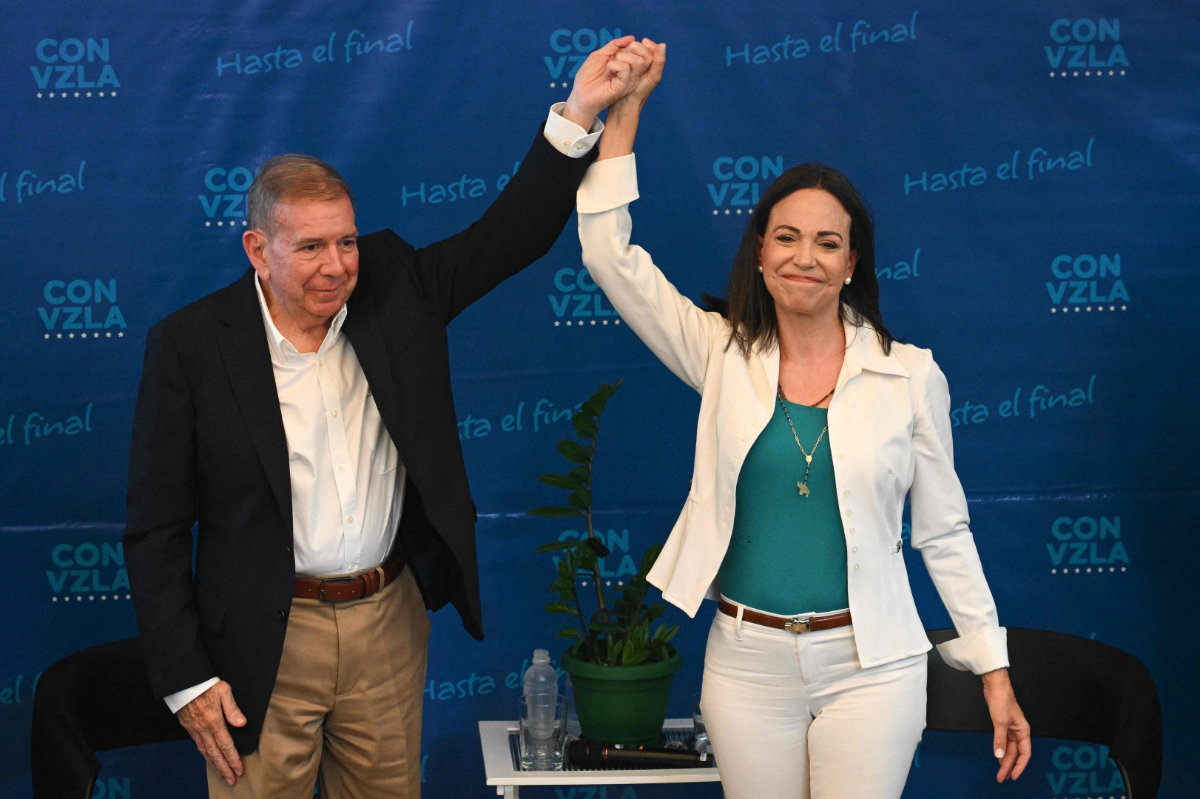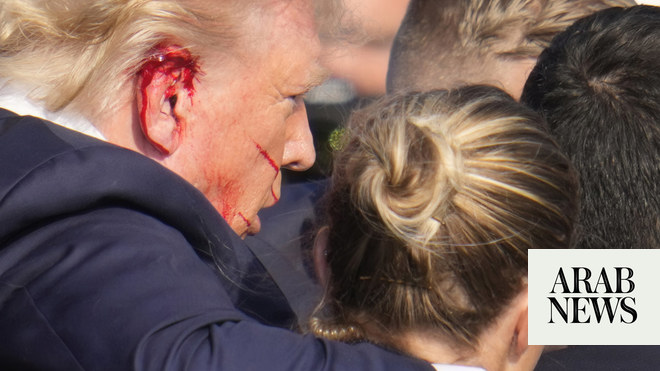CARACAS, Venezuela: Venezuela's future is at stake. Voters will decide on Sunday whether to re-elect President Nicolas Maduro, whose 11 years in office have been marred by crisis, or give the opposition a chance to fulfill a promise to reverse the ruling party's policies that have caused economic collapse and forced millions to emigrate.
Historically fragmented opposition parties have united behind a single candidate, presenting the United Socialist Party of Venezuela with the most serious electoral challenge in a presidential election in decades.
Maduro is being challenged by former diplomat Edmundo González Urrutia, who represents the resurgent opposition, and eight other candidates. Supporters of Maduro and Gonzalez ended the official campaign on Thursday with massive demonstrations in the capital Caracas.

Venezuelan opposition star Maria Corina Machado raises the hand of opposition presidential candidate Edmundo Gonzalez Urrutia (L) in a show of support during a press conference in Caracas July 25, 2024 ahead of Sunday's presidential election. (AFP)
Here are some reasons why elections matter to the world:
The impact of migration
The election will affect migration flows regardless of the winner.
Instability in Venezuela has driven more than 7.7 million people to migrate over the past decade, in what the UN refugee agency describes as the largest exodus in modern Latin American history. Most Venezuelan migrants have settled in Latin America and the Caribbean, but they are increasingly targeting the US.
A nationwide poll conducted in April by Venezuelan research firm Delphos showed that about a quarter of people in Venezuela are considering emigrating if Maduro wins again. Of those, about 47 percent said an opposition victory would make them stay, but roughly the same number indicated a better economy would keep them in their home country. The poll had a margin of error of plus or minus 2 percentage points.
The main opposition leader is not on the list
The most talked about name in the race is not on the ballot: María Corina Machado. The former lawmaker emerged as an opposition star in 2023, filling the void left when the previous generation of opposition leaders fled into exile. Her principled attacks on government corruption and mismanagement rallied millions of Venezuelans to vote for her in October's opposition primary.

Venezuelan opposition leader Maria Corina Machado greets supporters during a campaign in support of former diplomat Edmundo González Urrutia in Caracas, Venezuela July 25, 2024. (REUTERS)
However, Maduro's government called the primary action illegal and launched a criminal investigation against some of its organizers. Since then, she has issued arrest warrants for several of Machado's supporters and arrested some of her staff, and the country's highest court upheld a decision to bar her from running in the election.
Still, she continued to campaign, holding statewide rallies and turning the ban on her candidacy into a symbol of the disenfranchisement and humiliation many voters have felt for more than a decade.
She lent her support to Edmund González Urrutia, a former ambassador who had never held public office, helping to unify the fractious opposition.
Together, they are campaigning on the promise of economic reform to lure back millions of people who have migrated since Maduro became president in 2013.
González began his diplomatic career as an adviser to the Venezuelan ambassador to the US in the late 1970s. He was posted to Belgium and El Salvador and served as Caracas' ambassador to Algeria. His last post was ambassador to Argentina during the presidency of Hugo Chávez, which began in 1999.
Why is the current president struggling?
Maduro's popularity has declined due to an economic crisis caused by falling oil prices, corruption and government mismanagement.
Maduro can still rely on a cadre of staunch believers, known as Chavistas, including millions of public servants and others whose businesses or jobs depend on the state. However, his party's ability to use access to welfare programs to get people to vote has diminished as the economy has frayed.
He is the heir to Hugo Chávez, the popular socialist who expanded Venezuela's welfare state while damning the United States.
Chávez, ill with cancer, chose Maduro to act as interim president after his death. He took up the role in March 2013 and the following month narrowly won the presidential election triggered by the death of his mentor.
Maduro was re-elected in 2018 in a contest widely seen as fraudulent. His government banned Venezuela's most popular opposition parties and politicians from participating, and because of a lack of a level playing field, the opposition called on voters to boycott the election.
This authoritarian bent was part of the rationale the US used to impose economic sanctions that crippled the country's key oil industry.
A mismanaged oil industry
Venezuela has the largest proven oil reserves in the world, but its production has been declining for several years, partly due to government mismanagement and widespread corruption in the state-owned oil company.
In April, the Venezuelan government announced the arrest of Tareck El Aissami, the once-powerful oil minister and a Maduro ally, over an alleged scheme that apparently saw hundreds of millions of dollars in oil revenue go missing.
That same month, the US government reimposed sanctions on Venezuela's energy sector after Maduro and his allies used the ruling party's total control over Venezuelan institutions to undermine an agreement to allow free elections. Among these actions, they blocked Machado's registration as a presidential candidate and arrested and persecuted members of her team.
The sanctions prohibit U.S. companies from doing business with state-owned Petróleos de Venezuela SA, better known as PDVSA, without prior authorization from the U.S. Treasury Department. The outcome of the election could decide whether these sanctions remain in place.
An uneven playing field
Freer and fairer presidential elections appeared a possibility last year when Maduro's government agreed to work with the United States-backed Unitary Platform coalition to improve electoral conditions in October 2023. The agreement on electoral conditions gave Maduro's government extensive relief from US economic sanctions against it state oil, gas and mining sectors.
A few days later, however, the authorities declared the opposition primaries illegal and began issuing arrest warrants and arresting human rights defenders, journalists and opposition members.
A U.N.-backed panel investigating human rights abuses in Venezuela has reported that the government has stepped up its crackdown on critics and opponents ahead of the election, subjecting targets to detention, surveillance, threats, smear campaigns and arbitrary prosecutions.
The government also used its control over the country's media, fuel supply, electricity grid and other infrastructure to limit the reach of the Machado-González campaign.
The growing crackdown on the opposition prompted the Biden administration earlier this year to end the sanctions relief it granted in October.
